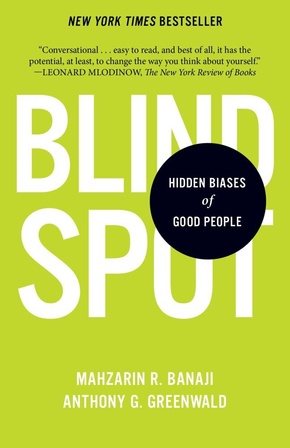
Blindspot - Hidden Biases of Good People
| Verlag | Penguin Random House |
| Auflage | 2016 |
| Seiten | 272 |
| Format | 14,1 x 20,6 x 1,5 cm |
| Gewicht | 201 g |
| Artikeltyp | Englisches Buch |
| ISBN-10 | 0345528433 |
| EAN | 9780345528438 |
| Bestell-Nr | 34552843EA |
A revolutionary new look at the origins and consequences of the hidden prejudices that affect us all, and how we can learn and grow from this understanding. For readers of Charles Duhigg\'s The Power of Habit and Dan Ariely\'s Predictably Irrational.
Klappentext:
Accessible and authoritative . . . While we may not have much power to eradicate our own prejudices, we can counteract them. The first step is to turn a hidden bias into a visible one. . . . What if we re not the magnanimous people we think we are? The Washington Post
I know my own mind.
I am able to assess others in a fair and accurate way.
These self-perceptions are challenged by leading psychologists Mahzarin R. Banaji and Anthony G. Greenwald as they explore the hidden biases we all carry from a lifetime of exposure to cultural attitudes about age, gender, race, ethnicity, religion, social class, sexuality, disability status, and nationality.
Blindspot is the authors metaphor for the portion of the mind that houses hidden biases. Writing with simplicity and verve, Banaji and Greenwald question the extent to which our perceptions of social groups without our awareness or conscious control shape our likes and dislikes and our judgments about people s character, abilities, and potential.
In Blindspot, the authors reveal hidden biases based on their experience with the Implicit Association Test, a method that has revolutionized the way scientists learn about the human mind and that gives us a glimpse into what lies within the metaphoric blindspot.
The title s good people are those of us who strive to align our behavior with our intentions. The aim of Blindspot is to explain the science in plain enough language to help well-intentioned people achieve that alignment. By gaining awareness, we can adapt beliefs and behavior and outsmart the machine in our heads so we can be fairer to those around us. Venturing into this book is an invitation to understand our own minds.
Brilliant, authoritative, and utterly accessible, Blindspot is a book that will challenge and change readers for years to come.
Praise for Blindspot
Conversational . . . easy to read, and best of all, it has the potential, atleast, to change the way you think about yourself. Leonard Mlodinow, The New York Review of Books
Banaji and Greenwald deserve a major award for writing such a lively and engaging book that conveys an important message: Mental processes that we are not aware of can affect what we think and what we do. Blindspot is one of the most illuminating books ever written on this topic. Elizabeth F. Loftus, Ph.D., distinguished professor, University of California, Irvine; past president, Association for Psychological Science; author of Eyewitness Testimony
